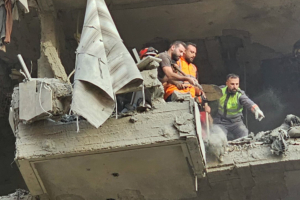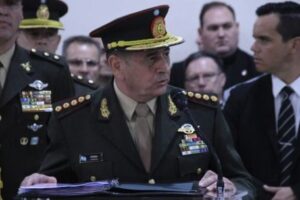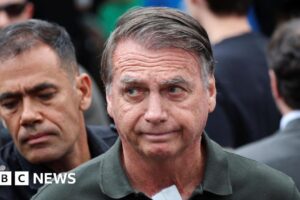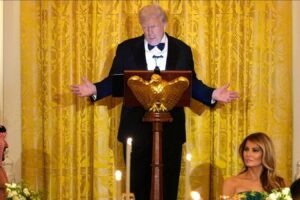
Argentine diplomat Rafael Grossi, the director-general of the International Atomic Energy Agency (IAEA), warns that rising global instability and the assertiveness of world powers have put a strain on the idea of “mutually assured destruction” acting as a deterrent against nuclear proliferation.
Speaking to Modo Fontevecchia on Net TV and Radio Perfil (AM 1190), the diplomat – seen as a potential future head of the United Nations – warned: “There is a very high degree of alert and a buzz suggesting the possibility that nuclear weapons may be used.”
Grossi, 64, is the first Latin American to lead the IAEA, a role he has held since December 2019 and to which he was re-elected in March. His four decades in diplomacy span peace, security, non-proliferation and international development efforts. Before taking charge of the agency, he served as Argentina’s ambassador to Austria and to international organisations based in Vienna.
There is increasing talk of it being Latin America’s turn to head the United Nations and you would be the candidate representing the most votes in Latin America. You would be a kind of ‘new’ Pope Francis for Argentina if you did become secretary-general.
Your reflection is very generous. I would never, of course, measure myself up to the Holy Father, whom I had the opportunity to meet on various occasions. I do believe there is a legitimacy to the idea of having an Argentine in such a post, which I also believe to transcend our own country. It should also refer to the region in accordance, with an unwritten law which makes plenty of sense. From 1945 until now the United Nations has been going for 80 years and in all that long period, there has only been one [Latin American] secretary-general, [the Peruvian] Javier Pérez de Cuéllar, followed by Europeans on several occasions, two Asians and also two Africans. So there is a logic to this but, as you know, elections are processes in which the regional issue is a factor but not an absolute one. The Security Council needs to be convinced as to who is the most capable person to head the United Nations in a period which is particularly difficult.
And on that point, you hear talk of the possibility of a Third World War due to the increase in the percentage of Gross Domestic Product being invested into armaments. Do you see the risk of a Third World War directly beginning with the atomic arsenal and not ending with it, like the Second World War?
That hypothesis cannot be excluded and that is already saying a lot. Why do I say this? Because there is a surprising fragmentation in the international scenario with a series of armed conflicts. One which is manifestly very great and important is in Europe between the Russian Federation and Ukraine, a major conflict. There are many others in Africa and elsewhere but it is there that the nuclear dimension is most to be seen because one of the two belligerents has nuclear weapons and is further indirectly confronting the NATO countries who are overtly supporting Ukraine.
The lines separating the confrontations between nations with those between powers can sometimes be confused so there is a certain fear about this. The degree of alert as to nuclear weapons has been raised by the Russian Federation with statements on tests, leaving it unclear as to whether the reference is to nuclear tests or tests of a more conventional nature. There is a lot of buzz evoking the possibility of using nuclear weapons.
Our work in the IAEA is fundamentally based on non-proliferation, ensuring that there are no more states with nuclear weapons than there are already today. And in that sense, this escalation of rhetoric with relation to nuclear weapons and of tests of different types of armament, the uncertainties as to the stability of the nuclear umbrella which a great power can give over others make for a growing number of important countries increasingly wondering aloud whether the time has not come to revise their abstention from having nuclear weapons and the global nuclear order as we know it today with rapid access to nukes. Let us imagine for a moment a world with this level of conflict and with 20 countries possessing nuclear weapons. That’s what it’s about.
You will have read about the so-called “Thucydides trap” and the projection that sooner or later an emerging power will trigger a conflict with the preceding power in the struggle for hegemony. Today the armament of the United States outweighs China three to one, but that one is enough to destroy the entire world. How do you imagine that mutual dissuasion is going to work like it did in the last part of the 20th century – i.e. the powers being able to destroy each other several times over being a guarantee of peace and not of war?
You are indirectly referring to the last part of my reply – i.e. is dissuasion, as we have understood it in the last 40 to 45 years, still valid? The assumption of a certain capacity of destruction inhibits the other from using nuclear weapons. Nowadays, for example, there is talk of limited nuclear conflicts, of tactical nuclear devices, of scenarios in which the use of nuclear weaponry does not necessarily lead to Armageddon, to a mega-confrontation in which the great powers give all they have got. This is a hypothesis which would need to be tested against what really happens. Let’s hope we never have to.
The new element added now is doubt. Mutually assured destruction worked as an unanswered premise for many decades and that seems to have been eroded – on the one hand, by the existence of smaller tactical nuclear systems, and also, by the fact that new powers are equipped with nuclear weapons and with those new powers you can never be sure that they will be playing that abstention game. So, the way the cards are stacked, there is a revision, a sort of reshuffle where the assumptions which reassured the world in the last 40 years are at least questioned.
In that context of the increased possibilities of nuclear armaments being used and that erosion of mutual dissuasion, might we say that the Southern Hemisphere will end up being more valued in geopolitical terms as a non-atomic peace zone, whether for investments, choice of lifestyle or the selection of strategic places for data centres – i.e. an advantage for the Southern Hemisphere as a hemisphere free of atomic bombs?
I believe that, in general, not having nuclear weapons is always an advantage because, in principle, those countries which do not have them are not included in the alliances deemed susceptible of being attacked with nuclear weapons. Remember, in the case of the Western Hemisphere and of Latin America and the Caribbean where we have the Tlatelolco Treaty banning us from equipping ourselves with nuclear arms but also [we have] the protocols of the countries which have them prohibiting other countries from placing these weapons in our region, which is also really very important.
But I will say that although it is true that not being involved in the nuclear arms race is a relative advantage, a world where there are armed nuclear conflicts does not, in the final analysis, benefit anybody. So it’s like thinking that if my neighbour falls, that’s his problem and I’m well protected in my snug home. The countries are highly integrated commercially, economically, etc. Let us imagine the economic, climactic, geographic and health consequences which a nuclear conflict might have. Naturally there would be an impact. But not being in the nuclear arms race is something to be evaluated positively.
What is your personal experience of the threats made against you by Iran following your analyses of their remaining nuclear capacity?
That’s a tricky one. Not just that it is something disagreeable but naturally the agenda of the agency which I have the honour to direct is totally sensitive and aimed at the most strategic and sensitive thing which countries possess. And without offering explanations or justifying those who have threatened me, it is understandable that this triggers enormous passions, enormous excesses, often verbal, at other times less so. In this case, it was for that reason that we had to accept special protection.
I believe that this has to do with one’s mission and sending out suitable signals that threats against personal security or blackmail do not affect us in our task. That’s how I take it as part of the responsibility of my work. Perhaps in other decades being seated in this chair would not have had this type of undesired consequences for your work. Today’s world is becoming enormously multidimensional where everything is mixed up with everything.
What does the end of the world, as defined by [the late Pope] Francis, the subjective Argentine viewpoint, have to contribute to international relations?
An awful lot, I think. Argentina is a country with a very interesting synthesis for the external observer – a country with a native element but basically moulded by immigration, people who came here to work and forge their future. It is a country which also has a very interesting and peculiar mix of producing raw materials with a highly interesting technological base. Indeed the fact that I am here, quite apart from any qualities I might or might not possess, also reflects a nuclear Argentina, an Argentina which has 50 years of very distinguished activity in the international strategic field. And that is not the only field – we have others in which we are also very distinguished. So I believe that makes us more plastic and flexible with a certain approximation, in my personal case, to negotiations which often produce results. At least that is what I would like to think.
related news





